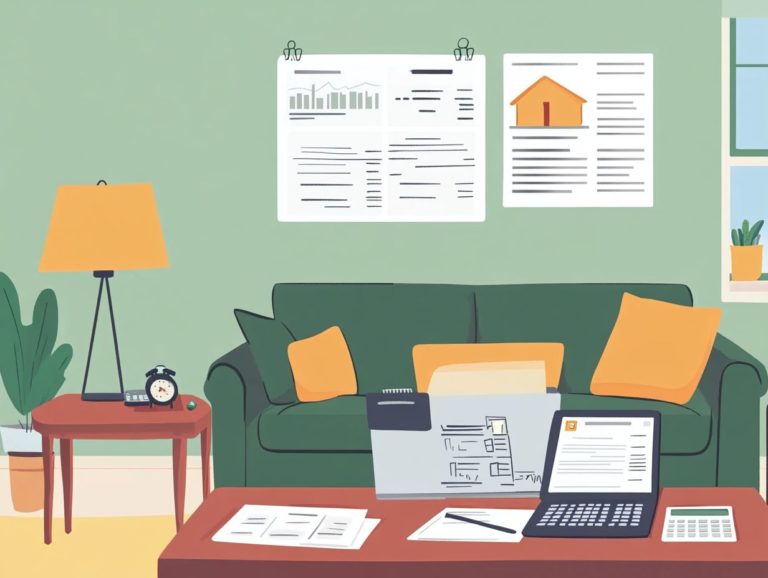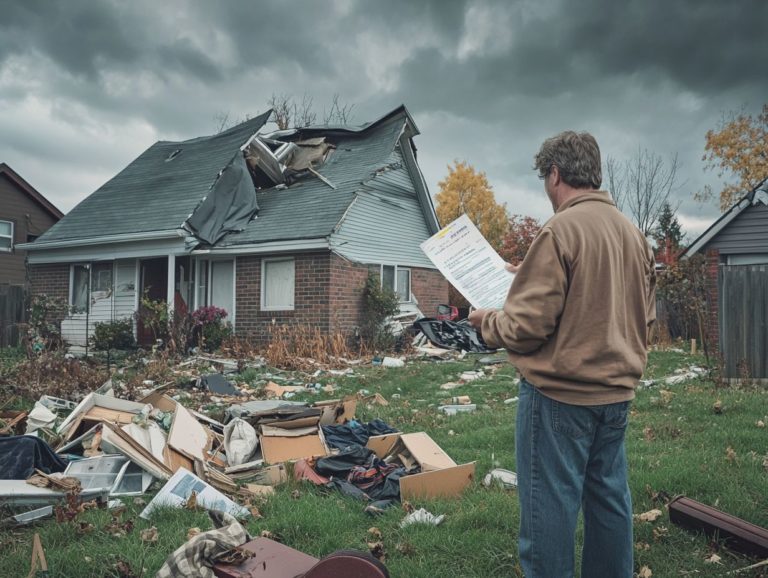How to Protect Your Home Against Insurance Fraud?
Insurance fraud poses a significant threat. It impacts both individuals and businesses and results in substantial financial losses annually.
By understanding the various forms of fraud and identifying the warning signs, you can effectively safeguard yourself and your assets.
This exploration will guide you through practical steps to prevent insurance fraud. You will learn about selecting a trustworthy provider and knowing the appropriate actions to take if you suspect any wrongdoing.
You can protect your home! Let s dive in!
Contents
- Key Takeaways:
- Understanding Insurance Fraud
- Signs of Insurance Fraud
- Preventing Insurance Fraud
- What to Do if You Suspect Insurance Fraud
- Frequently Asked Questions
- What is insurance fraud and how does it affect my home?
- What are some common types of insurance fraud that can target my home?
- How can I spot potential insurance fraud when it comes to my home?
- What should I do if I suspect insurance fraud has been committed against my home?
- How can I protect my home from becoming a target of insurance fraud?
- Is there anything else I can do to safeguard my home against insurance fraud?
Key Takeaways:

- Be on the lookout for red flags like exaggerated claims.
- Secure your personal and financial information.
- Report any suspected fraud to the authorities.
Understanding Insurance Fraud
Grasping the details of insurance fraud is essential. It encompasses a range of financial deceptions designed to benefit the fraudster while harming unsuspecting homeowners and renters.
This insidious form of fraud can take many shapes. For instance, deed theft is when someone illegally takes ownership of your property, while mortgage fraud may involve manipulating documents or identities to secure loans illegally.
It’s imperative for homeowners to be vigilant. Recognizing the telltale signs of insurance fraud and taking proactive steps, such as following how to protect your home from theft and insurance claims, can safeguard their investments and personal information against this widespread threat.
What is Insurance Fraud?
Insurance fraud encompasses any deceptive act aimed at securing an unfair or unlawful advantage from an insurance policy. This can manifest in forms such as property fraud, mortgage fraud, and identity theft.
Such practices undermine the integrity of the insurance industry. They impose significant burdens on honest policyholders, ultimately leading to higher premiums for everyone.
As a victim, you may face financial losses when fraudulent claims divert essential funds away from legitimate claims. This heightens your anxieties during critical times.
Fraud comes in many forms: staged accidents, inflated claims, and fake documents. Each of these actions carries serious legal consequences and fosters an environment of distrust.
Therefore, it is crucial for insurers to enhance their detection methods. Consumers must remain vigilant against potential scams that seek to exploit their vulnerabilities.
Types of Insurance Fraud
You may encounter various types of insurance fraud, including property fraud, mortgage fraud, deed theft, and several forms of identity theft.
These fraudulent activities erode trust in the insurance system. They also lead to substantial financial losses for both policyholders and insurers.
Property fraud often appears as inflated claims for damage or loss. Mortgage fraud typically involves misrepresenting income or using stolen identities to secure loans.
Deed theft is particularly insidious. It involves the theft of someone s property title to sell it without their consent.
It’s alarming that, according to estimates from the Coalition Against Insurance Fraud, insurance fraud siphons off approximately $80 billion annually from the U.S. economy. This statistic highlights the urgent need for vigilance and robust policies to combat these deceitful practices.
Signs of Insurance Fraud

Recognizing the signs of insurance fraud is vital for homeowners and renters alike. Timely detection can help you avert financial loss and protect your personal information from potential misuse.
Pay close attention to key red flags, such as discrepancies in property deeds, unexpected claims, or unusual requests for sensitive personal information. If you encounter any of these warning signals, act now to protect your assets!
Investigating further will help you safeguard your equity and assets against the threat of fraudsters.
Red Flags to Watch Out For
In insurance fraud, watch for several red flags that signal potential deception. Suspicious claims, inconsistencies in personal information, and unusual requests for consumer notification are warning signs to be aware of.
Recognizing these indicators is crucial for policyholders and insurers. For example, if there s a lack of documentation supporting claims or overly complex explanations, it s time to raise an eyebrow and investigate further.
If you notice frequent claims from the same individual or business that seem disproportionate to their history, remain vigilant. Regularly reviewing claims and fostering open communication can significantly mitigate risks and enhance the integrity of the insurance process.
Preventing Insurance Fraud
Preventing insurance fraud is essential to protect your property and personal information from unscrupulous individuals looking to exploit vulnerabilities. Additionally, learning how to save on home insurance costs can further enhance your financial security.
Key steps include:
- Securing title insurance to protect your property ownership.
- Monitoring your credit reports regularly to catch any suspicious activity.
- Understanding equity protection to safeguard your investments.
By staying aware of potential fraud threats, you can significantly reduce your risk of falling victim and protect your most valuable assets.
Steps to Protect Your Home
To effectively safeguard your home against insurance fraud, implement a series of strategic steps.
- Obtain title insurance and set up fraud alerts on your credit reports.
- Regularly monitor bank statements and credit card activity to catch unauthorized transactions early.
- Secure sensitive documents such as deeds and tax assessments in a safe location.
- Consult a trusted financial advisor for insights into current scams and precautions you should take.
- Maintain open communication with your insurers about any suspicious activity to enhance your defenses.
Taking these proactive measures seriously is vital for the lasting protection of your assets and personal identity.
Tips for Choosing a Reputable Insurance Provider

Choosing a reputable insurance provider is crucial for homeowners. It ensures you have the necessary protection against insurance fraud and property-related risks. A thorough selection process can greatly impact your peace of mind regarding property safety.
Start by researching the company s reputation in the industry. Review their financial stability and any complaints filed against them. Customer reviews are also essential. Analyzing feedback from clients will provide valuable insights into the provider’s reliability and customer service quality.
Furthermore, understand the importance of title insurance in safeguarding your investment and mitigating risks associated with property ownership. This emphasizes the necessity of careful selection when choosing the right insurance provider.
What to Do if You Suspect Insurance Fraud
If you suspect insurance fraud, act swiftly to protect your assets and personal information.
Begin by documenting any suspicious activities or discrepancies you observe. Once you have your evidence, report your findings to both the appropriate authorities and your insurance company.
This proactive approach is vital for minimizing potential losses and ensuring that any fraudulent activities are thoroughly investigated.
Reporting Suspicious Activity
Reporting suspicious activity related to insurance fraud helps protect you and your property from financial loss.
If you notice anything suspicious, act quickly. Contact your insurance company or local law enforcement right away.
Be prepared to describe what you saw, who was involved, and any dates or locations relevant to the situation.
It s a good idea to reach out to state fraud bureaus or the National Insurance Crime Bureau. These organizations work hard to fight insurance fraud.
Your observations not only protect your own interests but also contribute to the fight against this widespread issue.
Working with Authorities and Your Insurance Company
Once you report suspected fraud, collaborate closely with both the authorities and your insurance company. This teamwork ensures a thorough investigation and quick resolution.
Your detailed documentation and insights can help law enforcement and industry experts spot patterns of deceit.
Taking a proactive stance sends a strong message that you value integrity in your community.
Good communication is key. It helps address concerns swiftly and protects everyone involved.
Frequently Asked Questions

What is insurance fraud and how does it affect my home?
Insurance fraud is when someone gives false information or makes fake claims to get insurance benefits. This can lead to higher insurance rates or even loss of coverage for your home.
What are some common types of insurance fraud that can target my home?
Common types of fraud include fake damage claims, exaggerating the value of items, and staging accidents. These actions can lead to significant financial loss for you.
How can I spot potential insurance fraud when it comes to my home?
Watch out for suspicious behavior, like someone pressuring you to file a false claim. Also, check all your insurance documents to ensure they are accurate.
What should I do if I suspect insurance fraud has been committed against my home?
If you suspect fraud, report it immediately to your insurance company and local law enforcement. Keep any evidence that supports your suspicions.
How can I protect my home from becoming a target of insurance fraud?
Always be truthful when making insurance claims. Be wary of anyone offering unusually low rates for repairs or coverage, and review documents carefully before signing.
Is there anything else I can do to safeguard my home against insurance fraud?
You can take extra steps like keeping detailed records of all insurance claims. Maintain good communication with your insurance company and stay informed about fraud trends.






